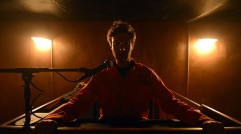Metropolitan Opera 2015-16 Review: Sondra Radvanovsky, Elina Garanca and Superstar Cast Deliver Searing Vocal Drama
"Roberto Devereux" is considered the third and final installment of Donizetti's Tudor trilogy. This season the Metropolitan Opera concluded the trilogy for the first time with the company premiere of the opera with Sondra Radvanovsky, completing the trilogy in a ravishing and complex portrayal.
Over the past few months Ms. Radvanovsky has taken on the roles of "Anna Bolena," in a portrayal that saw a weakened and heartbroken queen and "Maria Stuarda," which was a vocal masterclass. After these two challenging roles, it was hard to think of how she could top her herself. However, Radvanovsky showcased why these roles suit her best and her Elizabeth I in "Roberto Devereux" brought out some of the finest singing of her career as well as a dramatic portrayal that is among this year's best.
Sondra Radvanovsky's Complex and Emphathtic Elizabeth
Vocally, Radvanovsky started the night a bit cautiously and her first aria "L'amour suo mi fe'beata" was a bit messy with a number of rough patches particularly in her high notes. However, her cavataina, "Al Ritorno qual ti spero" showed off her vocal fireworks. In the second repeat, Radvanovsky started the cavatina with piano phrases before crescendoing and inserting a number of roulades that added a sense that Elizabeth was truly eager to see Roberto. She caressed the phrases before ending the aria in a high D.
In her subsequent duet with Roberto, "Un Tenero Core Mi rese Felice," Radvanovsky showed another character. While her aria had some moments of tenderness and ecstasy, Radvanovsky's Elizabeth yearned for the lost love of Roberto in this section. Her phrase started with a soft piannismo and as Radvanovsky moved around the stage it was as if she was trying to convince her Roberto (played by Matthew Polenzani) to love her again. As they moved into the more rhythmic passages, Radvanovsky's volume increased and her voice took another color.This was one of power, authority and anger.
In the subsequent "Nascondi, Frena i palpiti," Radvanovsky showcased her full vocal power yet again. In the repeat, she threw out some high notes fearlessly which got to the core of the ferocious pain she was enduring at being rejected.
What is interesting about this duet is that Donzetti returns to Elizabeth's rhythmic music from "Maria Stuarda." From this duet on, Elizabeth's second act music lacks the same melodic force that we hear in her first aria. As a matter of fact, during the second part of the duet Elizabeth's music begins in minor key and Roberto changes the key back to major. These contrasts are also seen in the stretta to Act 2 in which Elizabeth's music is also in minor key before turning back to the major.
In act two, Radvanovsky's Elizabeth turned to full on anger and pain. During the second act duet "Non venni mai si mesto" with Nottingham, Radvanovksy sang with full power emphasizing the words "irrfragabili prova." While the line could be melodic, Radvanovsky decided to emphasize the rhythmic phrases that would add to the rage emitted by this Elizabeth. In the second part of the duettino, Radvanovsky made sure to emphasize "Taci" and add in a number of roulades that showed that she was not going to give in to anyone. In her low range she gave off a sense of sarcasm as she phrased the words "A Demandar Merce."
And then in the terrezetto, Radvanovsky delivered impeccably with perfect coloratura. However, what was interesting about this Elizabeth was that unlike most, which are overtaken by anger, Radvanovsky's Elizabeth was weak to Roberto. During the trio, her phrasing was of a saddened woman starting from piannismi and crescendoing to a forte in the phrase "Scender vivo nel sepelcro" as if lamenting what was about to happen. This Elizabeth turned from an angry woman seeking revenge to a vulnerable woman overcome by love and the imminent sense of loss.
This was again emphasized by Radvanovsky's tour de force performance of "Vivi Ingrato" in the final act. Radvanvosky sang this aria with so much emotion and conviction spinning every phrase from fortes to pianos. There were no high notes to speak of but this was the embodiment of bel canto. It required beautiful singing but it created depth and emotion that expressed all of Elizabeth's fears, vulnerability and weakness. We saw her not as a Queen but as a human being in dire pain and in need of consolation and empathy.
In the "Quel Sangue Versato," the most famous piece from this work, Radvanovsky brought back the same power to her voice from the beginning. Her voice expressed the yearning but also emphasized Elizabeth's madness from the contrasts in the dynamics to the roulades. This was Elizabeth at her most vulnerable and bare and it was emphasized by her attire as she was left with no wig and just a night gown. Radvanovsky's weak and limp body movement brought the view a broken down woman who by the end of the work sings a High D and collapses to the ground.
Acting wise, Radvanvosky created the best character possible. As with "Maria Stuarda," this Elizabeth walks with a limp. While in Maria Stuarda, it really added nothing, here this limp showcased a broken-down Elizabeth at the end of her life. This Elizabeth also walked with a cane and Radvanovsky beautifully portrayed this weakness never overdoing it. The interesting thing about this Elizabeth was that everyone bowed down to her except for Roberto. As a matter of fact, in her two scenes with Roberto, each time it felt like they were in a constant battle over power. This was definitely seen in their duet as Radvanovsky walked across the stage in a confrontation stance and even hit Roberto across the face. In the third act trio, both of them also stood on opposite sides of the table confronting each other.
However, seeing how she was no longer able to convince this Roberto, Radvanovsky sat in her throne as an assertion of power. However, this chair seemed like a weakness for Radvanovsky as every single time she sat down it seemed like a prison and she struggled to get out of it.
A Scene Stealing Sara
While Radvanovsky clearly dominated the work, it was Elina Garanca who almost stole the show in her three small but crucial scenes. What is interesting about Sara's music is that Donizetti almost makes her a musical sister to Maria in "Maria Stuarda." Her lines are all melodic and linear and give off a gentle character that Elizabeth fails to do until the very end.
Garanca's portrayal is extremely well-rounded. In her aria "all'afflitto e dolce il pianto," this Sara lamented the impossible love between Roberto and her. Garanca brought out a youthful tenderness to the phrases. In her duet with "da che tornassi ahi misera," Garanca sang with such longing for old times and at one point in the scene she gave in to Polenzani's Roberto equally gentle singing. It was clear that Garanca's Sara longed for their past. She sang with ecstasy but at the same time with despair.
By the second part of the duet, Garanca let go of Polenzani in a realization of her mistake. Garanca did not look toward Polenzani and instead moved away from him. It was not until she sang "Una vita di dolor" that she moved toward him and by the last "addio" she finally looked at him again. Her voice took on painful color and was clear that Sara was tormented that she would never Roberto again.
In her confrontation scene with Mariusz Kweicien's Nottingham, Garanca showcased a physicality that was unmatchable. At one point she is thrown to the ground in what is one of the most visceral moments in recent opera. The moment had audiences gasping and what was more incredible was the way Garanca continued singing as she fell toward the ground. Her voice while showcasing vulnerability also brought out defiance. Garanca was not afraid to pull off those high notes which are reasons why so few take on Sara's high tessitura. She took them on with authority and command and while this Sara was clearly never going to win this power struggle, Garanca made it clear that this was no weak woman.
The Title Role
In the title role of Roberto Devereux, Matthew Polenzani once again showed why he is one of the leading tenors in the world. His voice continues to be a wonder in the lyric repertoire and this time it took on some dramatic colors that one had never heard. In his famous aria "Come uno spirito angelico," Polenzani sang with his signature mezza voce and beautiful legato ending his phrases with an impeccable falsetto. While his aria showed a more vulnerable side, the difficult cabaletta "Bagnato il sen di lagrime," Polezani sang with impeccable technique but there was something triumphant by the last note that Polenzani added.
In the duet with Elizabeth, Polenzani's Roberto clearly knew this was a confrontation scene and Polenzani did not mind displaying this with his high notes. In the repeat, Polenzani interpolated a high C against Radavanovsky's high note. This was no competition for who had the better high note,but a dramatic moment that stated that this Roberto was not afraid of Elizabeth nor did he care if he died. During this duet, Polezani also interpolated another high note on the words 'Non amo" and this was yet another dramatic moment that showed this Roberto didn't mind standing up to Elizabeth.
However, in the duet with Garanca's Sara, Polenzani was driven by passion, happiness and ecstasy. Unlike his confrontations to Elizabeth, here Polenzani searched for Garanca's Sara who constantly tried to move away from him. Here Polezani sang with ardor and passion, something that has not been heard before to this point in the opera. It was clear that he suffered to leave her and his high notes were cries of desperation. This was a revelatory Polenzani at his finest to date.
Nottingham and the orchestra
In the role of Nottingham, Mariusz Kwiecien added yet another fantastic bel canto role to his repertoire. Kwiecien who poses a smooth lyric voice brought his usual charisma to the stage. This character is somewhat similar to his recent portrayal of Zurga in Bizet's "Le Pecheurs de Perle." Nottingham starts out as Roberto's friend swearing to try and save him and winds up turning to rage when he discovers his friend has betrayed him with the woman he also desires. In his act one aria "Forse in quel cor sensibile" there was a warmth and smoothness to his voice that displayed sincerity and love for his friend. Even in his duet with Queen Elizabeth, Kwiecien brought a soothing line that tried to calm Elizabeth down. He sang with compassion and it was clear that Nottingham wanted to save Roberto from imminent death.
However, when he realizes that he has been betrayed, in the trio Kwiecien's character was tormented. While there was clear rage for what he had just discovered he played out the scene turning suddenly on Roberto. Kwiecien's warm sound was now one guided by strength and emotion. There were stronger attacks on the consonants with more staggered diction to express his growing aggressiveness.
This came to the fore in the subsequent duet with Sara as Kwiecien's Nottingham came in like drunk mad man. He ran toward her and clearly brought a violence that this character did not have before. At one moment he took Garanca's Sara by the neck, at another he put a knife at her stomach and as mentioned above, he also threw her to the ground. Kwieicien brought his complete dramatic arsenal that most have been used to seeing by now at the Met. What was more impressive was the sheer volume of his voice and his turn from the lyric singing to the dramatic vocal weight he gave to the music.
In the pit, Maurizio Benini led the orchestra with buoyant tempi adding dramatic urgency to Donizetti's music. It is said that belcanto should be all about the singing but the orchestra needs to add that sense of urgency and drama. Sometimes certain conductors become indulgent with slow tempi but Benini made sure to continuously move the orchestra forward, adding that energy and drama that bel canto often lacks due to its lagging and self-indulgent tempi.
The Production
It's easy not to pay attention to the inconsequential production that David McVicar has created for the Met. McVicar sets the opera in a theater similar to Shakespeare's Globe Theater in London and has the chorus play an audience. The chorus enters in and out of the room and claps when the leads first come in for no reason. It's quite distracting and it honestly adds nothing to what is already going on onstage. What's more infuriating is the fact that at the end of the opera the principals first bow to the chorus on stage and then to the audience.
The reason this does not work is because the chorus is basically unnoticeable except for when they are actually singing and because they only clap after certain scenes. It also adds nothing to the story or does nothing dramatically. It actually hinders from what is an otherwise perfectly traditional production. As a matter of fact, McVicar's production is filled with lavish costumes and a beautiful set. It is also impressive to see the depth of characterization that he achieves with his magnificent cast.
His Elizabeth is shown decaying through her costumes starting with an elegant white gown which is then followed by a black one emphasizing her shift from a hopeful lover to a bitter authoritarian. At the end, she is shown in a nightgown, the pomp and circumstance completely washed aside in favor of a truly vulnerable display that leaves her bare. The aforementioned interactions with Roberto and Elizabeth showcase Elizabeth at her most vulnerable.
It's a shame that McVicar did not stick to the same concepts from his past two Tudor outings. While his "Anna Bolena" was a bit unfinished the first time around, this season he added more to it that made it clear what his intentions were for the work. Meanwhile, his "Maria Stuarda" brought an intimacy to the work.
This "Roberto Devereux" is extremely effective if we are to look at the performers and their characters. However, his overall concept is extremely ineffective and bothersome when all is said and done.
Conclusion
While David McVicar's production is a letdown, he is able to add dramatic depth that absolves the concept of its guilt. Ultimately, however, opera and bel canto was meant to be seen for the singing. The Met has lined up four of the greatest singers currently in the industry and it has brought out some of the best performances of the season. If you're looking for searing vocal drama (and a lot of fireworks), this is the work to see. Sondra Radvanovsky proves once again that she was born to sing these works.
Subscribe to Latin Post!
Sign up for our free newsletter for the Latest coverage!














